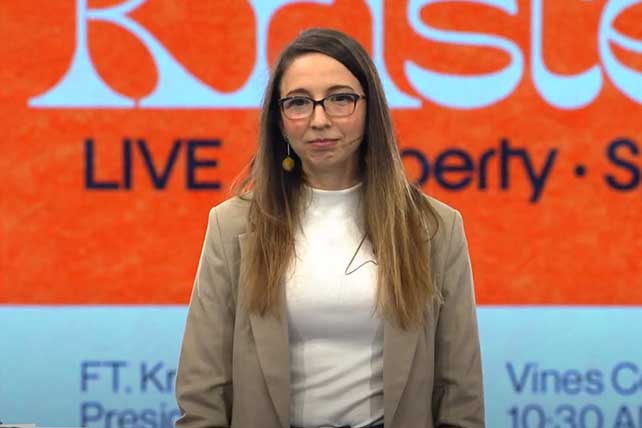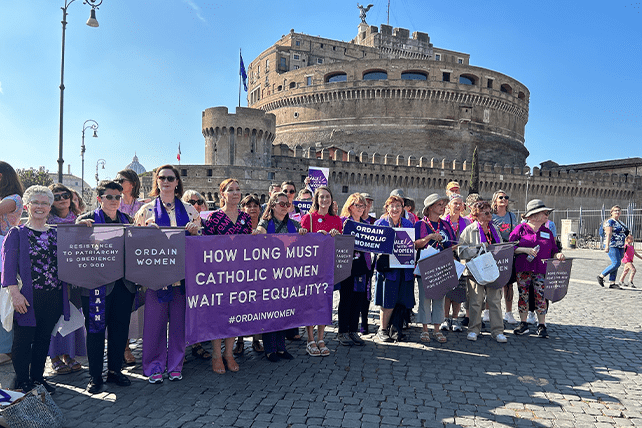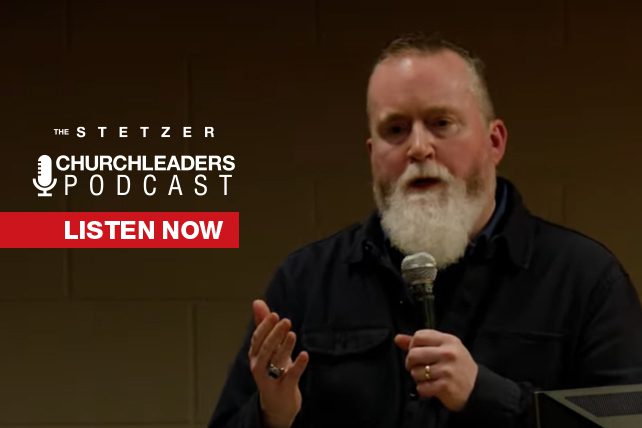Mark Yarhouse on The Stetzer ChurchLeaders Podcast.mp3: this mp3 audio file was automatically transcribed by Sonix with the best speech-to-text algorithms. This transcript may contain errors.
Voice Over:
Welcome to the Stetzer Church Leaders Podcast, conversations with today’s top ministry leaders to help you lead better every day. And now, here are your hosts, Ed Stetzer and Daniel Yang.
Daniel Yang:
Welcome to the Sister Church Leaders Podcast, where we’re helping Christian leaders navigate and lead through the cultural issues of our day. My name is Daniel Yang, national director of Churches of Welcome at World Relief. And today we’re talking with doctor Mark Yarhouse. Mark is a professor of psychology at Wheaton College, where he also directs the Sexual and Gender Identity Institute. He’s the author or co-author of several books, including Talking to Kids About Gender Identity A roadmap for Christian Compassion, Civility, and Conviction. Now let’s go to Ed Stetzer, editor in chief of Outreach Magazine and the dean of Talbot School of Theology.
Ed Stetzer:
Well, Mark, we’re former colleagues at Wheaton College together. And good to see you again. And I you know, you are a evangelical Christian in this field. I mean, you’re actually engaging in secular spaces in this field, which has got to make your life, uh, pretty exciting, particularly now that gender identity has become such a forefront conversation. So why is it that it’s suddenly a major topic of conversation in society, or are we misreading it? I mean, it just seems like it’s everyone’s talking about it now.
Mark Yarhouse:
Yeah, it’s definitely, uh, it’s definitely gotten centered in the cultural conversation like never before. I mean, it’s always been it’s interesting. It’s always been a part of the background of my work. I’ve always worked in the areas of sexuality and gender. Um, and when I would do trainings at, uh, you know, youth ministry events, uh, somewhere around 2010 or so, all of the Q&A was turning to gender, and it was telling me that this is a wave that’s going to crest on the evangelical church, and the church really wasn’t really prepared for that conversation. It was going to be a difficult conversation. And, you know, even I think was it time magazine had a cover years ago. That was the transgender tipping point. I think it might have been about that same time, but there’s this sense that this has become a very important cultural marker of what we believe to be true about sexuality and gender. It’s led to a lot of, um, political discourse. A lot of legislation has been drafted on both sides. Uh, so it’s it’s definitely heated up.
Ed Stetzer:
Yeah. It’s interesting. It took America about 40 years to change its mind about same sex marriage. And now if the election if states if proposition eight, like elections were held in, you know, proposition eight was the California Proposition that actually passed. Um, and if prop eight were held in most states today, almost with a very few handful would pass same sex marriage, and that would go from probably Stonewall to Obergefell, you know, historically to America, change his mind on same sex marriage. But the rapidity of the gender identity discussion where, um, where you can lose your job in some schools in California, if you’re a Christian teacher who declines to use the preferred pronouns of a student, I think it’s in the Chicago Police Department union contract that you can. If you misgender somebody, you can be fired. I mean that that’s such a and it seems that the, the pandemic and the, you know, the large amounts of online engagement in some ways seem to accelerate that. So have but has this are there always been people who identify? I mean, I sort of know some of the answers to these things, but but in the past we’ve seen this, but not to this level. So what’s shifted? Well, there.
Mark Yarhouse:
Have always been people who have a we’ll call maybe a discordant gender identity, where their gender identity does not correspond with their biological markers, and they experience that as a, as a real challenge. Um, and so part of my early writing in this area was just to tell people that. But things have shifted beyond that conversation. We have a lot of unusual, like maybe atypical presentations that are adolescents and young adults who weren’t atypical as a child, and they’re presenting as a disc with a discordant gender identity at 15, 16, 23, 25 for the first time without any history of it. So when there’s a history since like 4 or 5 years of age, you know, parents aren’t surprised. In a sense, it almost like helps put a puzzle piece in place. It’s like, okay, I knew something was curious, but I didn’t know what it was. And so now we have language for it. But these later onset cases, these may be atypical cases I think are really growing in numbers. And that’s at every gender clinic that keeps records of these around the world. So that’s a harder question to answer. Well, why is that happening? So there are some people who would say, well, it’s just we’re more socially accepting and we’re more positive about it. So people are going to come out and that’s definitely part of it. But I think to say that that’s everything that’s going on is really naive. I think there’s other pieces to this. It’s not clear what that is, but there’s definitely a kind of, um, cynicism towards sources of authority in society, including the church. The norms that are taught often out of the church or the church has had a role in. Teaching societal norms around sexuality and gender. A lot of that is being essentially questioned or deconstructed, viewed cynically. So a lot of things are kind of up for grabs in a way that has now focused on gender in a way that we hadn’t seen before.
Ed Stetzer:
Yeah, it’s and there’s so many questions that we could I mean, unfortunately, we’ll have a, you know, a brief conversation. But for example, why in California is it so much more than it is in Ohio? And people talk about contagion and things of that sort where there’s a sense that people sort of are engaging one another in ways that sort of are I don’t know, I don’t know what the right term would be to kind of describe that. But, I mean, I think for many Christians, they’re um, they’re now maybe in a way they haven’t seen 5 or 6 years ago. They’re having conversations about this in their church. So I’m, you know, I’ve had a couple of megachurch pastors whose children have transitioned, and there’s a there’s a high amount of shame that they’re experiencing. So I’ve, I’ve well, I’ve helped connect them with people, things of that sort because they’re not sure how to respond. And of course, that’s part of what you’re writing about in, in the book. And so the book is talking to kids about gender identity, a road map for Christian compassion, civility and conviction. And all three of those words matter compassion, civility and conviction. And so, so this is not something that it appears you could, you know, kind of ignore.
Ed Stetzer:
Um, but still, it’s something that, unlike same sex marriage, where Christians are just sort of, you know, evangelical Christians, Catholics and Mormons are sort of the resisters and out of the mainstream of culture now because of our convictions about marriage, uh, this is still one that’s a pretty active argument. And you find people who are not people of faith kind of standing up against the tide of, of, of of, of transgender, uh, well, even beyond acceptance and saying no. So we’re trying to figure out how to do all this. But let’s start with the pastoral question, because I think, um, there’s a cultural question too, but not every conversation is about both of those things. I think a lot of people confuse this in my field. I talk about engaging in mission and say, well, that’s we’ve got to engage in politics this way, where you can actually have different approaches depending upon where you are. But right now there’s a lot of hurting parents and a lot of, well, a lot of hurting children. Um, so so let’s let’s go there. So when you kind of start the conversation, um, what advice do you give to parents and church leaders about taking this, um, cultural conversation seriously right now in the midst of this moment?
Mark Yarhouse:
Yeah. A large, uh, part of the book is for me is to help parents not be so, uh, reticent to engage the topic. I think if you pull back on the topic, it’s still going to be talked about. It’s still going to be part of your child’s, um, middle school, high school, even elementary school in some situations. And so to not talk about it, to not engage seems to be problematic. Um, but a lot of parents come to me and say, we don’t even know where to begin. We don’t even know how to have this conversation. And so leaning into it, leaning into hard conversations, even ones that you might not have quite as much clarity around. Um, and part of part of what I say is that there are Christians who engage topics like this who are either chapter and verse Christians, or they’re themes from Scripture, Christians, and chapter and verse is a very comforting place to begin. Uh, it’s this chapter. It’s this verse to address this issue. But that’s a hard thing to do with this topic. There’s not a lot in Scripture that addresses what we’re talking about directly, but I don’t mean that to come across as though Scripture’s not speaking into this topic.
Mark Yarhouse:
It’s just that when you think chapter and verse, you know you’re going to get something like Deuteronomy 22 five where there’s, you know, men are not to dress as women, women not to dress as men. But then, you know, people bring up. Well, but that was in a context of possible ancient Canaanite practices that involve same sex behavior. So it gets kind of complicated as to how we think about that. But when you look at the full scope of Scripture from creation, the fall, redemption, glorification, uh, it seems to me that God’s intention was for our gender and our sexual sex to correspond, that they’re tethered to each other. And I want parents to have more, um, confidence in holding that conviction. And then how you hold it as you raise your children, how you hold it in relation to your neighbor, how you hold it in your school system. I mean, these all become relevant questions. Uh, how do you hold convictions? That’s just one of my three keys that the book is centered around. Conviction, uh, civility and compassion.
Ed Stetzer:
Yeah, but let me let me go to the conviction one. So. So you’re articulating if I understand the importance of having a conviction that God’s intent is that our gender and our sex should align. Of course, those words have changed meaning over time. I don’t think 200 years ago people would have thought about those words being able to diverge. Um, but but so but gender dysphoria, I think like people some people disagree with you. I’m not sure I’m. I’m 100% on same page with where you are. We’ll talk through some of that. Um, but I think we’re like, almost everybody agrees is that there are people throughout history and today who have find that the way they perceive their gender and their biological reality is different. And the term for that, the phrase for that is gender dysphoria. And I think that it would help pastors and our audiences, pastors and church leaders to acknowledge that there are probably people who experience and you probably have to explain what dysphoria is. We know what gender is, uh, experienced gender dysphoria. So what is it so that parents and pastors and church leaders are aware?
Mark Yarhouse:
Yeah. So I used the word earlier, gender discordance. And I just meant that if gender is meant to be connected to our biological sex, which is our chromosomes, our gonads, our genitalia, so that the biological markers of our sex as male and female, so gender and sex are meant to correspond to each other. And when they don’t, they’re discordant. Sometimes that’s distressing to people. And that’s what we call gender dysphoria. And that is a diagnosis that can be given to a child or to an adolescent or an adult. And it’s, um, you know, if euphoria is a positive emotional state, dysphoria is a negative emotional state that’s associated with that discordance between gender and biological markers. So for the vast majority of people, their gender and their biological markers correspond. There’s no distress there. There’s no issue. But when there is that discordance and it’s distressing, we might diagnose gender dysphoria. And that can be mild. It can be moderate, can be severe in the same person. It can ebb and flow in severity over time. Um, one person could have a very mild case, one person could have a more severe case. So those are all open questions when we meet with people okay.
Ed Stetzer:
And those but those are um, I think I think that I know very few people, um, in the secular world or in the Christian world, who would disagree that there are people who experience this. And I hear most of them kind of use the phrase gender dysphoria. I guess the question often is, how do we respond to that? So, um, because, you know, I believe and I think you believe that men and women are made in the image of God, and they’re made men and male and female. Um, and we, we then kind of you mentioned earlier aligning these gender identity with physical, uh, their physical body. So what’s how do we then have be supportive or pastoral, have a supportive pastoral posture versus showing agreement. Because this is where I think some of the pronoun questions come up. But but this talk to me in general. We’ll talk to you about the pronoun thing in just a minute. But what’s the difference between having being supportive with somebody who’s struggling with gender dysphoria and showing agreement? Where as evangelicals, we don’t believe that you can change your you a man can’t become a woman.
Mark Yarhouse:
So this is going to move us from conviction. You’re going to hold convictions here, but this is more compassion. So a good pastoral response to this would be to try to see through the eyes of the other and this involves cognitive complexity just being a little more flexible and understanding. Look, if this is not my experience, I don’t really know what the experience would have been like for somebody else. I remember one pastor reached out to me one time, called me on the phone, and he said, look, I’ve, I just was speaking to someone who’s transgender. And they were talking about visiting our church on Sunday. They called the church to see what that would be like. So I was talking to them. They wanted to meet for coffee. So I hung up and I called you because they didn’t cover this in seminary. I have no idea, you know, what do you even do? So I said, look, give them give them a call back. And here’s what I’d like you to do. Take him up on the offer to have coffee. But when you meet them, this guy was like, this person was maybe seven, uh, 50, 56 years old, the, um, transgender person. I said, when you sit down for coffee, here’s what I want you to say. I want you to say, I feel like I’m meeting you at about chapter seven of your life, but I haven’t had a chance to to hear about chapters one through six.
Mark Yarhouse:
And so in order to do shepherding with somebody, to meet them where they are, we’ve got to understand a little bit about the journey they’ve been on, how they got to where they are. You might again, you might not agree that where they are is where they should be. That’s another conversation in shepherding people. But how did they even get there would be a very good place to begin to lay a little bit of context on the shepherding you’re going to do. And of course, this person’s visiting the church. They’re not a member of the congregation. They’re not saying they’re sitting under the spiritual authority of you as a pastor. There’s there’s a lot of elements to, I would think, pastoral care in this moment. Uh, and I serve as an elder in my own church. And so I when I think about this, I, I do think about how would you, you know, shepherd somebody in that space, how would you walk with them? So on first meeting somebody who’s not even a member of the church, it feels like it would be a different kind of conversation than a long standing member who’s disclosing. This has been part of my life for many years, and I want to sit under the teachings of the shepherds of the church. That that would be a different conversation.
Ed Stetzer:
Yeah. And I think I. Think that that beginning conversation, that posture from the conversation really becomes a key part of the trickiness walking through it. So because right now, a lot of pastors and church leaders are not sure again, you’re in the book is titled again, the subtitle I want to get to is Talking to Kids about Gender identity, uh, a roadmap for Christian compassion and civility and Conviction. A lot of pastors and church leaders are unsure how to get from conviction to compassion. I know they’re in the order of compassion, civility, and conviction, but because partly is the person who’s struggling with gender dysphoria often, uh, maybe requires to be in conversation and relationship things that seem to go against the conviction, like the use of of new names or pronouns that am I participating in a fiction? So how do you and this is where it gets controversial, right? This is where and and people who are listening should know that Christians have come to different conclusions. And this is pretty ongoing debate. So how how do I do that and can I’m making the longest questions ever. And I want to say that when parents are dealing with kids, uh, it gets even more complicated, as you know, as a pastor and a church leader, I, you know, I don’t generally use, um, I don’t generally use preferred pronouns. I, um, I also say to people who have a, have a pastor or have a child that maybe come to me with a different conclusion that I’m not here with the hammer to say, here’s why I don’t might be how articulate it. And if you do, here’s some suggestions of how you might so, but you might have a whole different approach. Tell me. Yeah.
Mark Yarhouse:
So I generally do use the name and pronouns of people. Um, and much of that is a is in the spirit of, uh, having some compassion for how they got to where they are, that I’m, that I have some sense that even if I might not agree with all the decisions that they made, they’re at this place and they’re in front of me. God’s. And so, so sometimes this is framed as the, um, like, telling the truth versus demonstrating hospitality. And I think that’s a bit of a false dichotomy. I there are truths that I hold as a Christian. You hold as a Christian. The question is whether I’m going to relate to the person and underscore those things in the beginning of our conversation versus extending the relationship. So I guess I would say, you know, is it truth telling? Is it the is it the hospitality? In some sense, you’re highlighting one truth. There are multiple truths in this exchange. God providentially placed this person in relationship to me. I’m praying and asking God for wisdom and discernment as I consider how to extend the relationship over time. And so for me, I have felt that using preferred names and pronouns have helped to extend the relationship not just for the act of being hospitable, not just to be winsome for winsome sake, but to extend the relationship into an opportunity to talk from a different perspective.
Mark Yarhouse:
Now, in the book, I do call this ambassadorship. You are an ambassador of a kingdom, the Kingdom of God, in relationship to this person. But as you represent that kingdom, be aware that the people you’re talking to are increasingly unfamiliar with the language and categories that you use around gender and sexuality. That’s, that is that is going to create language barriers for you talking to that person. So when people don’t have the same frame of reference as me, as a Christian, I, I do extend a little bit more hospitality to build the relationship and to extend the relationship, but not at the expense of things that I hold. I’m not making an ontological claim about their sex. When I use a name and pronoun. I know people who say, well, I’ll use the name, but I won’t use the pronouns because that’s there’s a truth in that. Well, I mean, that’s a little bit of I mean, the name is kind of an extension of the pronoun.
Ed Stetzer:
But the argument is, is that person can name themselves anything they want, but they can’t change their, uh, their, their they can’t a man can’t become a woman. Thus I think that’s that’s the argument. So if I, you know, I can pick a name, people pick names or nicknames all the time. And so that’s okay. So that’s kind of the line where some people draw. So what then do you, um, or do you advise. And again, I want to because I recognize that you’re in counseling, which is a different thing than most of us are parents and church leaders. Again, Mark’s book is talking to kids about gender identity a roadmap for Christian compassion, civility, and conviction. So what do you recommend for pastors and church leaders? Do you say, um, well, I, I don’t I think that God’s design, I believe or I’m convinced or, you know, my conviction is that God’s design is is that your gender identity and your and your physical sex need that we can work with you to align those things. Do you articulate that? Would you suggest that people articulate that, or do we end up people making the assumption that we we think it’s a good thing, the overwhelming direction of the medical establishment, the educational establishment, is we need to help you to find and live your gender identity. When we we don’t think the same way. How do you recommend or do you recommend people articulate that.
Mark Yarhouse:
Yeah. Well there’s a third option. There’s an option of how do I manage this dysphoria. How do I cope with this. This is a more of a besetting condition. So when people talk about, well just help them align with their biological sex. There really aren’t protocols that have been developed to do those types of things, and.
Ed Stetzer:
That’s not quite what I’m asking, but I get I want, I want you to explain that because I think that’s that’s helpful, helping them to manage their gender dysphoria. But what I’m asking is if I’m a pastor and someone comes to me and I’m going to walk pastorally with them, do I articulate my in your view, do I articulate my conviction about sexuality and gender? Uh, just to be forthright, to say, listen, I want to walk with you through this. I need you to know that I believe the Bible teaches that that you know, etc., etc., and then work with them. Or is it, I guess, the concern some people have, you don’t articulate that. They might assume that what you’re helping them do is to find their true gender identity, rather than managing gender dysphoria and aligning those two things. Is that does that make sense?
Mark Yarhouse:
Yeah, that’s that’s helpful. I mean, you’re talking about something you hold as a conviction. And and we’re also going to talk about the timing of when to share what you hold.
Ed Stetzer:
That’s mainly what I’m asking. How how do I articulate that when in the relationship I’m if they come to me as a pastor, they probably know where we stand. But but how? What would you recommend?
Mark Yarhouse:
Okay, so I don’t think there’s one thing you do for every person who comes your way, because you’re going to see multiple transgender people navigating this space, or gender dysphoric people navigating this space. I could imagine a scenario where I share that up front, because I don’t want them to find out three months later that I hold this conviction, and they feel like I kind of duped them. Like, I get that. On the other hand, I’m not sure it’s a first conversation with the one pastor who met for coffee to say, hey, while I get this coffee, I just want to tell you, I mean, I think I would listen for a while before I landed it. Here’s what I want to share with you. Or maybe, you know, our church is just beginning to think about this, or we’ve never thought we’d be at a place where we’d have to write a policy about this. But here’s what my here’s what my thinking is at this point because of my Christian convictions. And as a pastor, here’s what I think. And so I think you hold that conviction. Um, but you don’t have to, um, you don’t have to weaponize that conviction in a relationship with somebody. You can. I have this quote that I use in the book a few times from Anne Lamott, and she and I would disagree on a number of things, but she has this interesting quote that has nothing to do with this topic. But I did quote her on this. She says, um, the sword of truth can be used to chop, but you can also point with it.
Mark Yarhouse:
And so I think the way I’m more about how do you hold these convictions in relation to this person in front of you? So if they’re in, let’s say, okay, people who are gender dysphoric are also often dealing with a depressive disorder and anxiety disorder. Other mental health we call co-occurring issues. So as a pastor doing an assessment meeting with them for the first time, I would want to make sure that the other co-occurring issues are being attended to by a good counselor that you trust to help them alleviate their depression, alleviate their anxiety. Why? So that they can see more clearly as they face the questions around their gender. I don’t want people making a decision about their gender out of a depressed mood state, right? A major depressive episode. Nobody would want that. So I think to help people see more clearly, do good assessment, you know, help people shepherd people in that space. Yes, you might share with them our church position, our denomination is this this is our understanding. But obviously that doesn’t always map on to how you’re experiencing this. But I, I want you to know that you’re of no less value to God or to me. If you make a decision that’s in a different path than the one I’m sharing with you right now. But I haven’t walked with that many people. So I’m going to walk with you. I’m not going to. This is not a conditional relationship that I cease to be in relationship with you. If you make decisions that aren’t the ones that I think I would make if I were in your shoes.
Ed Stetzer:
Yeah, it’s. And there’s so many questions and I and I have thoughts too. But this interview of you. So I’m going to I’m going to and again the book that we’re talking about and I really um, I don’t know of a lot of books in this space talking to kids about gender identity. Um, because what seems to happen is these conversations are younger and younger and parents are unsure, and a child comes to them. And, you know, I mean, years ago, we would say, you know, to a kid who, you know, I mean, when when I was raising my kids or even generations before, we would just say no, do this and move on. And of course, we know that most kids, um, I don’t know, the right term would be grow out of it. Um, but but certainly in the popular sense that that’s a part of it. So when do you think you would want to start having conversations about sex and gender with children? Okay, well.
Mark Yarhouse:
I’m a fan of talking to them throughout their lifespan, so at a young age. So I like the book, um, how and when to Talk to Your Kids About Sex, which is by Stan and Brenna Jones about this. And they wonderful, wonderful.
Ed Stetzer:
Friends of both of ours. So yeah.
Mark Yarhouse:
And they have a four part series called The best.
Ed Stetzer:
The best resource on the topic. Yeah.
Mark Yarhouse:
And so they they would have, you know, from 3 to 5, you have a, you know, you have one kind of conversation when you’re giving them a bath and you’re naming anatomy and things like. That you have a different conversation. 5 to 8. You have a different conversation 8 to 11. And then into adolescence, it might be some of the same topics of sex and gender and anatomy and things like that, but it’ll take on new meaning developmentally, as they know what the words mean. They have a better sense of their own body, uh, about their sense of personhood, about God’s design. You’re saying these things that God made you a boy. God made you a girl. Like these are things that you, uh, you hold to be true, and you declare these things over your child. Now, there are instances where that child may experience a different kind of discordant experience, a dysphoric experience, than you had named. Because for most children, it’s going to be kind of seamless and it’s going to not be an issue. But in some instances it may unfold as an issue and nothing to do with your parenting that we understand. We’re not quite sure why this would happen for some people, but it’s it’s a I think it’s a real experience that a child may have. They might not have the words for it to communicate to you as a parent that they’re experiencing this discordance, this dysphoria. But we sort of tell from different symptoms that we would see if it was, you know, being evaluated and things like that.
Mark Yarhouse:
But I think families who go through that tend to be pretty compassionate to other parents who are navigating that space. And most pastors would not have that. They would maybe have that. You mentioned a couple of pastors you’ve consulted with who’ve, um, had children come out to them and disclose their dysphoria and navigating these issues later in adolescence, perhaps that does happen. So again, compassion for that experience, um, a good assessment of how it came about. Um, you mentioned Covid earlier. We mentioned, um, potential, um, social pressures, peer group pressures, things like that. Yeah. So I don’t tend to use for me, I don’t tend to use the word social contagion just because it’s a little potentially antagonizing in this moment. And that’s actually coming out of the eating disorder literature, where it’s been pretty well researched, that there are cultural messages shared among peer groups about body weight, shape and size and standards for beauty and things like that, and that adolescent females are more susceptible to those messages than adolescent males. So I think some people have kind of copied and pasted that over to the gender conversation and said, that’s what’s happening here. And it very well may be a part of this, but it hasn’t been researched as well. So I try to be a little a little bit of discipline and not using phrases that might come across differently than just.
Ed Stetzer:
It does seem that there is a, um, I mean, it’s it’s not hard to notice that in there’s a difference from, again, California to Ohio in how people are responding, though I will tell you, with the internet, Ohio’s, you know, I mean, the influence comes from the coasts in generally. So, um, you know, I think the is it the most recent Pew study said that 25% of it’s a little less than that, but almost 1 in 4 women in their 20s identify as LGBTQ plus. So, I mean, certainly there’s there’s something shifting in our culture. Um, and I guess the question, well, maybe I’ll just ask you, do you, um, I mean, we acknowledge that for years. It’s actually a fascinating preacher back 100 and something years ago that, uh, that talked about her, his, her gender changing and all this sort of stuff. And it’s it’s a very fascinating moment in history, um, that religious scholars know of. So this has happened. Gender dysphoria has been something people have experienced for, for, for centuries and centuries that we know of. Um, I guess the question I would ask is, do you think the cultural, uh, not just openness, but often advocacy find your own self? And do you think that has increased, uh, people struggling with gender dysphoria? Do you see a correlation between those things?
Ed Stetzer:
The sets are church leaders Podcast is part of the Church Leaders Podcast Network, which is dedicated to resourcing church leaders in order to help them face the complexities of ministry. Today, the Church Leaders Podcast Network supports pastors and ministry leaders by challenging assumptions, by providing insights and offering practical advice and solutions and steps that will help church leaders navigate the variety of cultures and contexts that we’re serving and learn more at Church leaders.com/podcast network.
Mark Yarhouse:
Yeah. I think the study you’re thinking of, I was thinking of the Gallup poll, but you are seeing a rise in these cases.
Ed Stetzer:
It might be the it might be sure which one it was, but it was about 1 in 4 in young women in their 20s.
Mark Yarhouse:
But what’s driving it is females who are bisexual is driving. Those are the highest numbers. And so that’s not even a gender conversation. It’s a it’s a sexuality conversation. So I do think that that is a shift. We are seeing that. And some people treat that as maybe I just leave all my options open. But a lot of those what we’re seeing is they settle into heterosexual relationships, whether they identify as heterosexual or not. We’ll see. But they tend to land on normative sexual relationships ultimately, even though at the time the poll is done, they may identify as bisexual. But I do think you are seeing, um, uh, a lot of cultural variables about this. I do think this is a search for my own authentic self to for some people. I just don’t want to confuse that with true gender dysphoria when it’s a real condition that someone’s hurting from. That’s one thing. When it’s when it’s somebody saying, I’m, I’m jumping on the recent cultural trend. Right. That’s another thing.
Ed Stetzer:
Well, that’s one of the reasons I love about you. One of the things I love about you is, is and the reason I’m having on here is that you are one of the few people who are engaging in this as a professional who’s training people in counseling. And so it is right that you would go to that. You’re sort of saying, yes, there may be there may be those you might call it social contagion. I might use that language. But I’m primarily concerned about helping people who are struggling through this. So I receive that, you know, for us, you know, again, this this came out after your book. But I do wonder, uh, when you look at the cast, you know, the cast review is what everyone’s talking about today, because part of the concern for many Christians in the public sphere. And of course, you talk about compassion, civility and conviction. How can we have a civil conversation when many of us are concerned that the rush towards medical intervention on younger people is, uh, is really, well, at its simplest is a bad idea in general. And the cast review for a lot of us sort of put a, put a, put a picture of that. Yet the US continues to rush headlong into more aggressive engagement of medical procedures. So so talk to us a little bit about that. I know that came out after your book, but you are you are the leading evangelical expert in the world in this space.
Mark Yarhouse:
No, I mean, that was a good it’s a good review. There’s there’s going to be a few more reviews coming out, but I think it’s a really good review. I’d encourage people to, to read it. Um, I mean, it’s 300 plus pages, but I mean to at least read summaries of it and there are some there. What Cass is saying is what myself and a number of other people have been saying, uh, that in a sense, uh, the protocol that’s being provided, which is this kind of medically affirmative care for minors, you know, the medically affirmative care has been on the table for adults for some time, and it’s usually been a very rare phenomenon. And it’s generally I mean, we could debate how helpful it’s been, but yeah, I mean, we.
Ed Stetzer:
Saw in the 70s the news, but but I haven’t heard I mean, I hear it calling gender affirming care is sort of like USA today and CNN rates it. So medically medically medical care.
Mark Yarhouse:
Yeah okay. So it so it became it came out of the Dutch protocol and it came to the US some time ago. And what happened in the Netherlands is they tend to be a little bit more comprehensive in their evaluation. Some of their research is also being challenged and questioned. But generally they’re a very comprehensive clinic. And in the US it’s the only and that’s the only clinic for the Netherlands. So you go to the US and we have, you know what, dozens and dozens, maybe hundreds of clinics, gender clinics, they don’t all follow the same protocol. They don’t all do the same thing. They’re not all comprehensive. I’ve met with a number of people who teens who can go to Planned Parenthood and get hormones in 45 minutes and they, you know, they just isn’t the level of comprehensive care in the US in the desire to be as affirming as possible. And that’s what I think the Cass review reminds us. Look in your effort to be affirming, you could actually be doing some harm to young people because you’re not being careful about what’s actually going on. What if there are these co-occurring issues? What if it’s connected to autism spectrum disorder? What if it’s related to ADHD and things we don’t even understand what those connections would mean, let alone you’re not assessing for them or screening for them. So I mean, those are really good advice. We don’t have long term outcome studies of medically affirmative care with adolescents. Right. So we have better data with adults. But when you’re talking about 15 and 14 no we don’t. And so Cass is right to say let’s slow down. Let’s do due diligence on this. And so a number of countries are instead of doing just gender affirming care, they’re doing it under research protocols, and they’re doing it with more informed consent and they’re being more careful. I think those are those are really good steps that I hope other countries in the US would follow. Yeah, the.
Ed Stetzer:
Us seems to. To be becoming more and more of an outlier on some of those things across Europe. I’m, I’m, uh, you know, so so what would you say to somebody like me? And I’m guessing most of my audience is, you know, I’m not a professional counselor, and I’m, you know, I don’t generally use, uh, you know, pronouns in in that way, though, again, I recognize that, you know, sometimes if you when you have a child, you’re trying to navigate through keeping a relationship. I, I have compassion for those who come to a different conclusion. Um, but what would you say to me, who probably is more representative of pastors and church leaders and a little more cautious than where you lead more with your, you know, counseling and compassion? I’m more cautious. What would you what would you say to me? And I receive it, whatever it may be. I mean, I don’t know, I’ll change my mind, but I want to hear what it would be from somebody who might take more. You need to build the bridge more. Well, I.
Mark Yarhouse:
Mean, I again, I kind of like you. I have a lot of respect for people who disagree with me and land in a different space. I just would I’m not sure how many people they’ve sat with, how many people they’ve counseled, how many people they’ve shepherded in this space. What I find is a little bit of a correlation between the numbers of people you walk with and a little more latitude in the shepherding accommodations. But but please hear me, I respect people who land in different places on this, but I would like to, you know, invite them to walk with people in this space. Yeah. It might not mean you change dramatically. You know, your use of things like and this is not, you know, a podcast about pronoun use and things like. It’s a small point in the overall, but.
Ed Stetzer:
It is right now a major part of the discussion. So and and and and partly to because when you talk about your three C’s in this ambassadorial role of compassion, civility and conviction, it appears that this is the primary place where they collide because you’re using pronouns, because of your compassion and desire to stay in relationship. For people who don’t use pronouns, it tends to do with their conviction. Uh, and so so that’s where it seems. And maybe there are other areas because I think we I think we agree on, on almost all other places of in the general conversation. I don’t know if you and I do, but in the general conversation that, you know, we have this conviction about men and women being made in the image of God, male and female. We have this conviction that that gender dysphoria is real. The question is, how do we engage? Am I, am I, am I missing that? Is that I know this is not it’s not even the theme of your book. Uh, but it does come together at that point of conflict in our in our current conversation.
Mark Yarhouse:
No, I think you summarized that pretty well. I mean, there’s a lot of agreement. I’m an I’m an evangelical Christian. We probably agree on 90 plus percentage of doctrines and the most important things that Christians adhere to from your little.
Ed Stetzer:
I know you say you’re a little more Armenian Armenian than you need to be, but other than that, I like you so.
Mark Yarhouse:
So. But what I say in the book is, look, look at the alternatives here. You’re what I see in Christian circles is that many people are either culture warriors and or their cultural capitulates, and a cultural warrior is somebody who sees any openness to like, meeting people where they are as a concession. And so you’re always at war. So when any legislation is introduced, anything is talked about as, uh, anything other than the way that people see the outcome should be, uh, it’s a threat to, to a person in battle around societal, uh, um, norms around sexuality and gender. The other extreme, though, is the capitulated the, the Christian who says, okay, there’s 100 plus genders. Like they never bring a Christian worldview into the conversation. They never seem to critique any trend that’s going on culturally. So we don’t want, in my view, I’m not in favor of the warrior. I’m not in favor of the capitulated. I’m in favor of ambassadorship. So now we’re getting into the nitty gritty of how do you hold those convictions? How are you civil to your neighbor who’s made a different decision? But here part of my point is, if your neighbor does not know Christ and they’re transgender and your neighbor to the other side does not know Christ, and they’re not dealing with these issues, neither of them knows Christ.
Mark Yarhouse:
So how are you going to build a relationship with them as a neighbor so that they know? Because in a sense, you’re asking them to abide by norms. You hold convictions you hold as a Christian when they’re not a Christian. We don’t normally do that. When we interact with agnostics and atheists and other people, we don’t think to ourselves, well, why aren’t they abiding by Christian teachings or Christian understandings of sexuality and gender? No. You realize you know why they’re cohabiting because they don’t have a standard for relationship that we do as a Christian for the covenant of marriage. Okay, well, why would we do it differently around gender? Why would we not say, okay, my neighbor has no reference point for my Christian convictions. So I’m going to hold that with civility, with respect as I engage with them, and compassion that I’ve never walked that journey in my life. Okay. So there’s elements of all of that that should be going on here. You don’t jettison your convictions, just as I wouldn’t with my agnostic. But I’m not going to come to every meal I have with them, you know, with my Bible smacking it down on what they need to believe about Christ.
Mark Yarhouse:
I’m asking them ultimately to the work of the Holy Spirit, to trust that God is a good and loving father whose plan for their sexuality and gender is better than the plans that they see around them. But they’re not going to get there unless they have a relationship with God. And that’s usually interpersonally mediated through relationships with people who are little Christs, the Christians that they know. So I kind of want us to be thoughtful about how we engage. And then as we as parents, you raise your children how they engage with their peers in middle school, in high school, some of whom are going to be transgender, some are going to be experimenting, or they’re going to be in this space. How do you want to prepare them to be ambassadors in their middle school, and how do they hold their convictions? Are they warriors in middle school? Are they capitulated in middle school? Are they ambassadors now? We might. Your audience and yourself. We might have different visions for what ambassadorship looks like, but let’s at least get to that space, and then let’s have a good conversation about what it means to be a good ambassador. I think that’s just a better a better reference point for this conversation.
Ed Stetzer:
I think that is a a good and persuasive articulation. I have some nuances here there. But it’s an interview rather than, than than me and you having a this kind of deep conversation. But I, I, I feel that compassion um, and, and I don’t see myself in the culture warrior category. I don’t think most of our listeners would, but but at the same time, I get why this is a challenge. And that’s one of the reasons I think resources like this are helpful is that, again, it’s talking to kids about gender identity, a roadmap for a roadmap for Christian compassion, civility and conviction. So when you kind of walk through questions of gender dysphoria and and transgender experiences, you know, you mentioned that there are chapter and verse Christians and theme Christians, and I’m not sure which I am, because I need you to define that a little more. But, uh, but we can find guidance from the scripture on these topics. So how do we do that? You meant you went to Deuteronomy and, you know, mentioned that may have to do with, uh, you know, prostitution and things of that sort. But the where do we how do we find guidance from Scripture in these topics? I know you do.
Mark Yarhouse:
Yeah. I mean, I think some, some, some topics lend themselves to specific chapters and verses and people put them on their dashboard and they reference them for managing, you know, anxiety, self-preoccupation anger, things like that. But some topics are a little more complex. I think gender dysphoria is a little more complex. It’s hard to just put a chapter on your dashboard and say, that’s how I’m going to orient myself to this whole conversation. And honestly, I don’t look to Scripture to give me the level of detail that some people look for, for, like treating gender dysphoria or, um, you know, science for the. Well, we can get into a whole lot of topics here about about the world and, um, things like that. So I tend to think of the scriptures as a reliable, uh, truthful guide for what it’s intended to teach us, which is our relationship with God. It’s a letter from God to us about a relationship that he wants with his people. That’s kind of how a number of people would view this. And so that’s kind of how I approach it. But that doesn’t mean it doesn’t speak to gender. I just think it it describes gender as it was lived out in the eras that it was written.
Mark Yarhouse:
Uh, and so I don’t think it was meant to tell us a lot about it other than, again, I’d go through the four acts of the biblical drama. I’d go through the expectations at creation that those aren’t just descriptive. Uh, they’re they’re meant to establish norms for sex, that there male and female, that God intended that that is good. They correspond in what we call a covenant of relationship of marriage. Um, but we don’t live in a creation order. We live in a fallen world that’s being redeemed. So that brings us into three more, you know, acts of the biblical drama. How does the fall affect our sexuality and gender? I think of dysphoria as reflecting the fall. It’s not the way it was meant to be. Okay, but God doesn’t leave us in our state. He’s redeeming us actively all the time. But it doesn’t mean that every issue like a number of medical conditions, psychological issues, conditions like this get resolved. I don’t know that we have good evidence that this gets resolved. Um, uh, I think people end up living with it as a more of a besetting condition in most cases once they’re adults. So so the.
Ed Stetzer:
Condition where they and you’ve said earlier that they, they manage their perceived mismatch, mismatch of their gender identity and their sex in different ways. Right?
Mark Yarhouse:
Well, I mean, when you sit down as a pastor with somebody, you would you could tell in the first five minutes of the conversation some ideas of how they may be managing it. Let’s say it’s a biological female who’s sitting across from you, and she keeps her hair really short. Or maybe she wears long sleeves. Um, to or big baggy clothing to hide body shape and size. That’s that’s distressing to her. That’s the key. Or you sit down across from a biological male who keeps his hair longer, or maybe wears long sleeves to cover secondary sex characteristics like body hair. Again, they might be taking little steps like that to manage the dysphoria. Most people wouldn’t see those as moral issues, as issues of faithfulness. They’re just using, you know, cosmetic and appearance to help with this. So, um, so hairstyle, clothing, um, and then some people might move towards pronoun and name would be an extension. It might be a bridge too far for many Christians, but it might be a way to to kind of manage that dysphoria. I know parents who’ve used nicknames with their dysphoric children because they couldn’t use a cross-gender name, but they could come up with a nickname that they it’s gender neutral, you know, like star that they used to call them when they were, you know, six.
Mark Yarhouse:
And so they, they called them that with their permission now, because it’s a way to honor the relationship and the person that they are, but also their convictions that they can’t quite go to where their teenager or young adult wants them to go, or maybe even, you know, insist that they go. So they have these concessions. But you’re seeing when you sit down as a pastor with someone, they’ve already taken some steps to manage this dysphoria. And I call that in my, my, my resources. I call that like a plateau. They’re managing this when the culture around them says you should move towards the mountaintop. Experience of a cross gender identity, medically confirmed in your life and and pursued that way. Sometimes our society treats that as a mountaintop experience that everybody should move towards. If you have gender dysphoria, what I would say is you’re living in a plateau. The plateau. When I meet you, you’re at a plateau so we could shepherd you. At that plateau, we can always revisit whether a different plateau would be helpful to you, but we don’t want to treat, um, as though it’s an inevitable inevitability that you pursue medical not just for Christian convictions that we may have, but also because most adults don’t do that in the data that’s out there right now.
Mark Yarhouse:
Most adults in the US do not use hormone treatment and do not use gender confirming surgical procedures. Now, they may want to it might be the cost is prohibitive. It may be that they don’t have good insurance coverage. Uh, it may be personal convictions. You know, we don’t always know, but most adults don’t do those things. And so it’s kind of like talking to a teenager about all their peers being sexually active. If they think all their peers are sexually active, are they more or less likely to be sexually active? Well, they’re more likely to be sexually active. So I don’t want young people to think that everybody’s using medical when most are not using medical. So most people find a plateau. And, you know, as a counselor, I can help you find a plateau as a pastor, perhaps that’s a frame of reference you could use. How do I help this person find their plateau in the teachings of our church, our denomination’s teachings around these issues? Because if I’m when I function as an elder, it’s not as open ended as when I’m publicly functioning as a psychologist. It’s it’s a different role that I’m playing with people in my relationship with people.
Ed Stetzer:
Yeah. And I think, I think part of the reason we’ve gone a little long on the podcast. So thanks for sticking with us. I think part of the problem is, is that, um, if we don’t have, uh, kind of an affirming mentality that, you know, person should explore, you know, this, uh, this journey, I guess, used term to go to the, to the mountaintop. Um, it seems that for a lot of pastors and church leaders, they don’t know what the matter of fact, what you just said about plateau may be one of the most helpful things that have been said here. Because what they’re like. Well, no, just stop. You should stop that. And you should just acknowledge and accept that your your gender identity may be, you know, dysphoric, but you need to just stop and do this when really what a lot of people and I’ve seen, this is what they need is a pastoral approach to manage that. And you use the term besetting, which is of course, a biblical term with which we’re familiar. So again, the book for just so people are aware, uh, the book is talking to kids about gender identity, a roadmap for Christian compassion, civility and conviction. What, um, other resources on gender identity and sexuality do you recommend to parents? You mentioned, uh, the Jones book already, and we’ll link that in the program notes. But what other things are there for children’s ministry youth leaders about kind of navigating this topic? Yeah.
Mark Yarhouse:
So I wrote I wrote a book, um, for, uh, it’s from InterVarsity press. Um, it’s, uh, when children come out. So it’s the what happens over the next 4 or 5 years when a child comes out to a Christian parent. What’s that journey like for them on average over the next 4 or 5 years? What’s the relationship like? Where are the points of tension? How does it improve? And then, um, what’s their spiritual journey like? As parents, I think parents are one of the most. Um, important people in the data shows this in the life of their adolescence as they grow. Uh, their well-being, the adolescents well-being is tied to the quality of relationship with their parents. It’s very, very important. But parents are one of the least written about people in this whole equation. All of the ink is towards the person navigating these issues, which I can appreciate. But don’t leave out the parents. What you could do as a pastor to support parents in that space is is so important just to let them, uh, to so that the parents know that they’re not to blame for their child navigating these issues. I think that’s a huge issue in the church. We often have a evangelical subculture of shame that if my child deals with this, it’s my fault. And so you don’t tell anybody. One of my friends who runs a parent ministry says, when a child comes out of the closet in evangelical circles, parents go into the closet. And I think that kind of captures that. Anyway, I think that’s a really good that’s a that’s a little self-serving, but that’s a good resource. Um.
Ed Stetzer:
Uh, just just to echo that, I’ve given that resource away to people. So I do think it’s a helpful resource, but keep going.
Mark Yarhouse:
Yeah, I think it may. So Preston Sprinkle has a nice book on called embodied where he engages gender issues. He’s kind of like, I’m doing it as a psychologist. He’s doing it as a New Testament, uh, theologian. So I think he tries to engage that as well. And I think that’s been, uh, demonstrates a lot of compassion towards this population. And he and I, he lands a little bit differently on some things. I think that, uh, would be good for people who might hear me and say, I don’t know about that, but I think maybe Preston could be a good fit. Um, and then, um, there’s, uh, um, there’s a pastoral letter, uh, on gender dysphoria. Um, that is, I’m not sure if it’s been published, so let me. I may have to get back to you about that one. Um, but it’s a it’s a letter, um, that a pastor wrote to his congregation.
Ed Stetzer:
Yeah. And we’ll put when you send it to us, we’ll put it in the show notes as well.
Mark Yarhouse:
Okay. So there’s a few things that I think there’s not a lot out there, to be honest with you. And it may feel a little bit like the Wild West of how even people writing about something as controversial as this. But there’s not a lot that’s been written, um, that I think demonstrates the kind of walking with people that I’m trying to underscore here.
Ed Stetzer:
Good. Well, again, we’ve gone long, but, uh, last thoughts that you’d say to pastors and church leaders to people. Again, we talked about the book, and I guess I would, you know, just kind of in general, you talk about these three keys of being a cultural ambassador, if you wouldn’t mind, just kind of summarize how pastors and church leaders, our audience, it’s the Stetzer Church Leaders podcast can be those things.
Mark Yarhouse:
Well, you’re already an ambassador. You’re already doing it. So you have the ability, you have the skill set, you have the these opportunities. You do it well. I think already with people who are agnostic or atheist who have a different demographic characteristic. I think when we get into LGBTQ conversations, it really trips some people up. So I would fall back on the resources that you already know, the ability you already have to equip people to relate to their neighbor, their coworker, their extended family in these areas and hold the convictions that you hold. Practice articulating them. Coach people in your church on how to articulate and hold those convictions, not just hold them and declare them, but the timing out of a relationship, just as you would a neighbor coworker who’s agnostic atheist, you would have these conversations with convictions, but you’d also be very respectful of a different perspective, even if it’s not one you hold. Both are not knowing Christ. So let’s have those civility in those relationships. And then when we talk about mental health issues and navigating complex things that might be painful, just compassion for what that might be like. Those three C’s to me represent ambassadorship. Even if we were to disagree on some of the specifics of the three C’s, at least ambassadorship is a frame of reference. That’s biblical. That’s an alternative to a warrior and to capitulation. I think that positions us better as church leaders in this space.
Ed Stetzer:
Fascinating conversation. And and what I think we’re going to have to have more of, Mark. And the part of the challenge is, is that we’ve had a good conversation where we might disagree on some things, but but, I mean, Christians are trying to navigate this space, are getting in a circular firing squad. And that’s not helpful. And I think ultimately, um, we are finding ourselves increasingly on the other side of the cultural divide. We’re being increasingly seen as the problem, certainly around same sex marriage, where I think the HRC, the Human Rights Campaign calls us the resisters. And I think we need to find a way to hold to these convictions. And again, I like I like your three C’s, probably because I’m a preacher and they alliterate. But to our conviction, um, compassion and civility, I think they. All matter, because at the end of the day, I think the biblical teaching is and God’s design for men and women is is his intent and it’s his best for us. So thanks for taking the time and thanks for like, I know, like you’re not just like in the Christian space. You do this in the American Psychological Association space, which is very hostile. Well, let me ask some more question. I mean, here I am, I keep I want to wrap up, how do you navigate that over at the APA?
Mark Yarhouse:
Well, I mean, I you know, I’ve referenced research here a number of times in our conversation. And that is the currency in in psychology. It’s not you know, there’s ideological positions as well obviously. And it’s not be naive. But I think when you come in, you talk about research, you talk about religion as an important aspect of diversity. I think those at least get you a hearing. Uh, there are hard conversations and not everyone’s a good dialogue partner. But those who are you can have really good conversations that are research based on, like, I study how people navigate this space. And when you do research on how people do that, you presented at APA, you have good conversations with people who may agree, may disagree, but good dialogue partners are also hard to find in the church. And so, you know, you’re trying to find reasonable, you know, let’s reason together with people who think about these things and are willing to engage, uh, because I’d love to have a little bit more latitude as Christians are working this out. I mean, I’m trying out in this space, and it’s been challenging, but I’m I share more in common with other Christians on a whole host of things that are the most important essentials of faith. And I hope we would have, uh, some latitude for each other as we sort through and pray about this difficult topic.
Ed Stetzer:
Mark your house. Thanks for taking the time to be with us. Yeah.
Mark Yarhouse:
Thank you, I appreciate it.
Daniel Yang:
We’ve been talking to doctor Mark Yarhouse. Be sure to check out his book, Talking to Kids About Gender Identity A roadmap for Christian Compassion, Civility, and Conviction. And thanks again for listening to the Stetzer Church Leaders podcast. You can find more interviews, as well as other great content from ministry leaders at church Leaders, compered casts and through our new podcast network at Church Leaders Compered network. And again, if you found our conversation today helpful, I’d love for you to take a few moments. Leave us a review that will help other ministry leaders find us and benefit from our content. Thanks for listening. We’ll see you in the next episode.
Voice Over:
You’ve been listening to the Stetzer Church Leaders podcast for more great interviews as well as articles, videos, and free resources, visit our website at Church leaders.com. Thanks for listening.
Sonix has many features that you’d love including advanced search, collaboration tools, enterprise-grade admin tools, transcribe multiple languages, and easily transcribe your Zoom meetings. Try Sonix for free today.













 In today’s fast-paced world, the pressure to always be productive and constantly in motion can be overwhelming.
In today’s fast-paced world, the pressure to always be productive and constantly in motion can be overwhelming. 






 How can we better understand anxiety and better navigate conflict in our lives and ministries? In this week’s conversation on FrontStage BackStage, host Jason Daye is joined by Kevin Ford, chief catalyst at Leighton Ford Ministries. Kevin’s expertise is in leadership, organizational culture, and strategy. He’s worked with Fortune 500 companies, small businesses, and government agencies. But his passion is working with the church. His most recent book is titled, “Attentive Church Leadership.” Together, Kevin and Jason explore some of the sources of anxiety that we find in our lives and in our ministries. Kevin also shares how we can address and navigate conflict in healthy ways.
How can we better understand anxiety and better navigate conflict in our lives and ministries? In this week’s conversation on FrontStage BackStage, host Jason Daye is joined by Kevin Ford, chief catalyst at Leighton Ford Ministries. Kevin’s expertise is in leadership, organizational culture, and strategy. He’s worked with Fortune 500 companies, small businesses, and government agencies. But his passion is working with the church. His most recent book is titled, “Attentive Church Leadership.” Together, Kevin and Jason explore some of the sources of anxiety that we find in our lives and in our ministries. Kevin also shares how we can address and navigate conflict in healthy ways.








